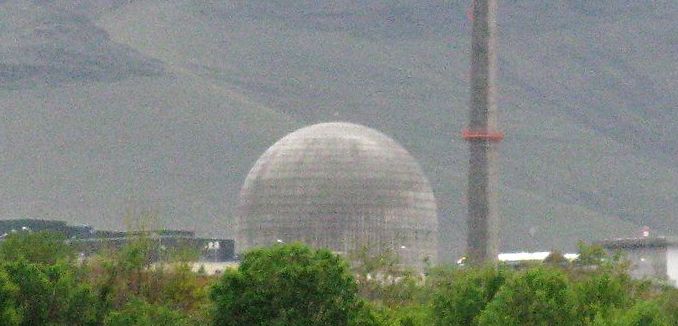Reports from German intelligence agencies show that Iran is still attempt to procure illicit technology, including parts for the operation of its heavy water reactor, which was shuttered under the terms of the 2015 nuclear deal, Benjamin Weinthal reported for The Weekly Standard on Friday.
A report from the state of Hamburg concluded, “there is no evidence of a complete about-face in Iran’s atomic polices in 2016” following the announcement of the nuclear deal, which temporarily limited Iran’s nuclear program in exchange for billions in sanctions relief. Iran has continued seeking “missile carrier technology necessary for its rocket program,” the report added.
Also according to the Hamburg report, three German citizens were charged with violating export bans for sending 51 specialized valves to Iran. The parts can be used in Iran’s Arak heavy water reactor, which “can be used to develop plutonium for nuclear weapons” and was shut down as part of the nuclear deal.
In general, Iran is seeking “products and scientific know-how for the field of developing weapons of mass destruction as well [as] missile technology,” the report noted.
The 181-page report documented 49 separate instances of Iran engaging in illegal procurement and terrorist activities, such as cyberwarfare, espionage, and support for the terrorist group Hezbollah.
An incident detailed in an intelligence report from the state of Baden-Württemberg documented the effort of a Chinese export-import firm to locally purchase “complex metal producing machines.” After Berlin’s Federal Office for Economic Affairs and Export Control requested a special permission for the machines to be shipped to Iran, Baden-Württemberg’s intelligence agency warned the company that the machines were set to be illegally diverted to Iran. “This case shows that so-called indirect-deliveries across third countries is still Iran’s procurement strategy,” the report observed.
A 339-page report from Germany’s Federal Office for the Protection of the Constitution, equivalent to the FBI in the United States, noted that Iran has also continued pursuing its ballistic missile program. The report noted that while the terms of the deal called upon Iran not to advance its ballistic missile program, “The amount of evidence found for attempts to acquire proliferation-sensitive material for missile technology/the missile program, which is not covered by the [nuclear deal], remained about the same.” (While the nuclear deal did not focus on other Iranian violations of international law, United Nations Security Council Resolution 2231, which implemented the accord, “called upon” Iran “not to undertake any activity related to ballistic missiles designed to be capable of delivering nuclear weapons, including launches using such ballistic missile technology.”)
Weinthal reported on Saturday in The Jerusalem Post that the federal German report also found that Iran continued to surveil local Israeli and Jewish institutions. “The State of Israel, its representatives and supporters as well as members of the Jewish religious community are among the declared enemies of Iran. Even the agreement made between Iran and the Western world to settle the nuclear conflict has not changed this attitude,” the report found. “Therefore, Iranian intelligence-related organizations continue to spy on (pro-)Jewish and Israeli targets in Germany.”
This year’s German intelligence reports are consistent with those issued in previous years.
Two years ago, despite the ongoing nuclear talks (and right before the talks concluded in an agreement), German intelligence agencies found that Iran was evading the existing sanctions on acquiring both nuclear and ballistic missile technology.
Iran’s continued effort to procure nuclear and other prohibited technology prompted Weinthal and Emanuele Ottolenghi to ask at the time, ““If Western powers are reluctant to penalize Iran for trying to evade sanctions because they’re afraid of spoiling the negotiations, what will happen in the future when Western powers have even more invested in preserving an agreement?”
Last year, German intelligence agencies reported that Iran was actively seeking chemical and biological weapons capabilities in Germany. Weinthal reported earlier this year that there is evidence that Iran played a significant role in developing Syria’s chemical weapons program.
[Photo: Nanking2010 / WikiCommons ]




